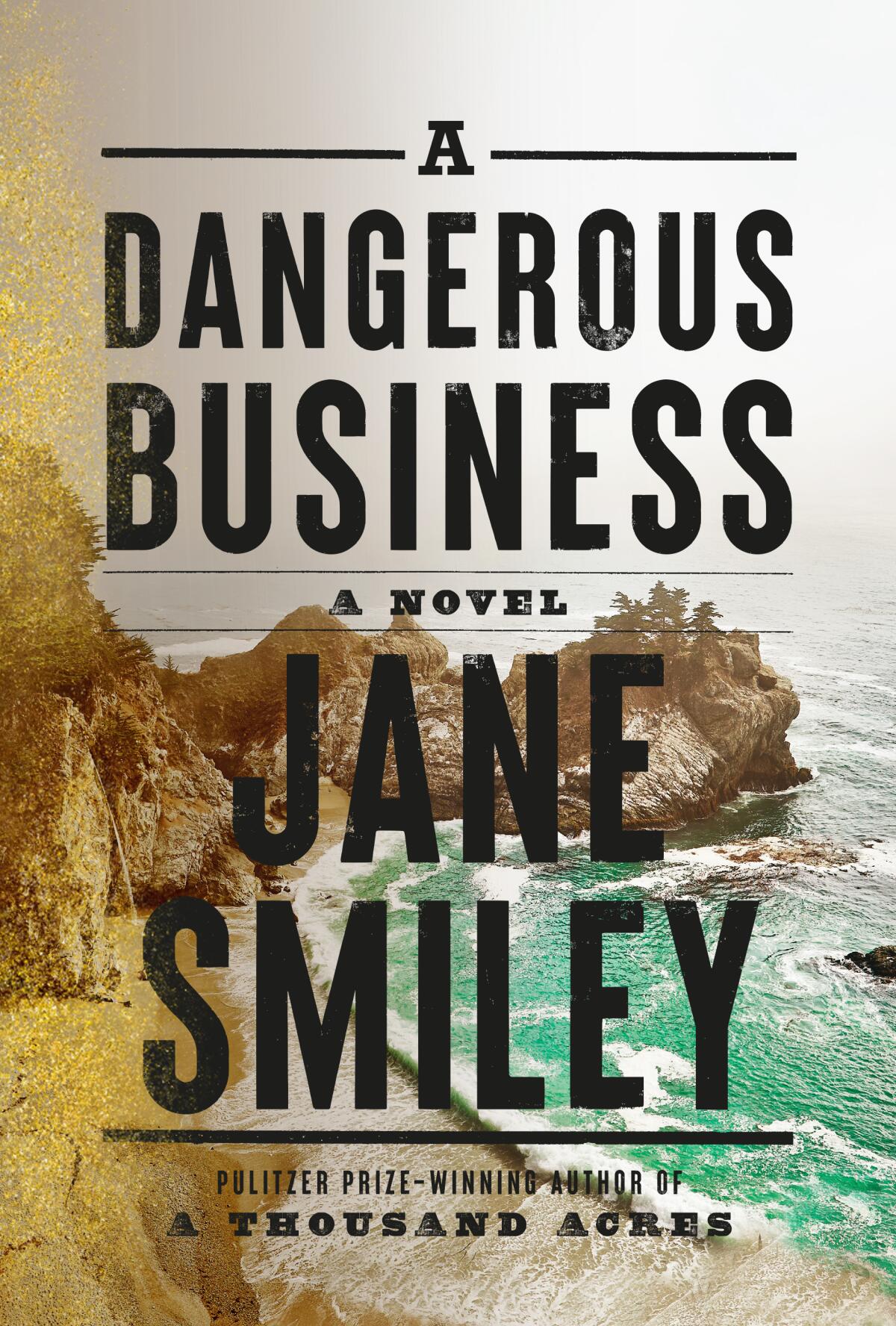Jane Smiley’s latest? A Gold Rush-era California sex worker mystery

- Share via
Review
A Dangerous Business
By Jane Smiley
Knopf: 224 pages, $28
If you buy books linked on our site, The Times may earn a commission from Bookshop.org, whose fees support independent bookstores.
Eliza was free. Dragged west to Gold Rush California from Michigan by her bully of a husband, liberated by a bullet that turned her into a widow, she considered her future in the windswept port town of Monterey. She did not miss her husband, who before he died had “made it clear that he intended to put it to her, whether she liked it or not, once or twice every day.” She did not miss her strait-laced Christian parents. She did not miss Kalamazoo.
Eliza’s options were limited. The logical next step for a woman without means was prostitution, and she took it up with few regrets. The widow known as Eliza Cargill became the whore Eliza Ripple. She found work in a high-class brothel and, blessedly free of the conventional obligations of womanhood, she serviced a lot of customers, from teenage virgins to fragile old men. She even made a friend. Life seemed tolerable, even better, until other prostitutes, nameless young women whom no one seemed to miss, began to disappear.
This is the setup of Jane Smiley’s “A Dangerous Business.” Smiley, the Pulitzer Prize-winning author of “A Thousand Acres” and many other novels, lives in Monterey County, and her new book is an homage to her home’s frontier past, when Monterey was a motley mix of banks, bars and brothels, a magnet for sailors, grifters and fortune hunters, ringed by rolling hills and trackless backcountry. This is a deftly constructed historical novel, but it’s also a murder mystery — and in that respect, the results are mixed.
Melissa Chadburn’s first novel, ‘A Tiny Upward Shove,’ recasts the tragedy of a lost woman’s murder as a Filipina hero’s journey of vengeance
Eliza’s urge to find the truth behind the disappearances begins with a literary argument with her friend Jean, a cross-dressing prostitute and adventuress who services women. The subject of their dispute: Edgar Allan Poe, a horror writer whose short stories were giving Americans the creeps from coast to coast. Fast friends, “the only thing they disagreed on was the work of Mr. Poe, work Jean loved and Eliza didn’t like at all, as it was too strange and gave her the jitters. Yes, said Jean, that was the point, and she never minded having the jitters. That, at least, was better than feeling down; it gave you a curiosity about things.”
Curiosity could get a woman into trouble, but as Eliza reads she begins to warm up to Mr. Poe and his detective C. Auguste Dupin, finding something in her own makeup that mirrors the Frenchman’s coldly logical mind. As more bodies are found, Eliza and Jean are drawn into their own investigation. They have a knack for seeing what others don’t — a stained glove, a bonnet string, a corpse without a “baby finger” — but are hobbled by the fact that the citizens of Monterey don’t care about the victims and are not sorry to see them disappear.

The law, such as it exists in frontier California, does nothing. Even Mrs. Parks, Eliza’s employer, warns Eliza to keep her mouth shut. Like serial killers throughout history, the Monterey murderer preys on people who have cut ties with anyone who might report their loss. Even politics plays a role: Eliza acknowledges that “all of this could become an excuse to drive Mrs. Parks out of business and put all the girls into jail.” So Eliza and Jean patrol the streets and ride the hills above town, looking for bodies and clues.
Smiley has created several engaging characters. She vividly recalls the political uproar of the 1850s, when the country’s unity was threatened by the pernicious practice of slavery and even citizens of far-west California were drawn into the roiling debate over its future. Her wry sense of humor is a bright thread, and it must be said that Smiley, a lifelong horse owner, writes some of the best horses in fiction.
The prolific novelist wrote “Perestroika in Paris,” about a horse and a dog in France, because it was soothing to focus on “kindness and trying to get by.”
But suspense in this story is like a simmering kettle that never quite boils. There are walks, conversations and discoveries; the sense of threat, however, is muted. Another ingredient in the narrative’s subtle, dreamlike quality is Eliza’s detachment, which is baked into her personality and heightened by her profession. Eliza is an acute observer of men and a kind human being, but the nature of her work requires that she disengage. What drives her, beyond the need to protect herself and survive? What tips her over the edge and into a confrontation with danger? It’s not completely clear.
Then again, Eliza’s detachment is her greatest asset; it helps her rise above the horrors she and Jean confront. After a dear friend is murdered, Eliza thinks of Poe’s detective and searches the author’s words for guidance and strength: “What struck her the most about Dupin was that he could look at all sorts of injury and destruction and still keep thinking in what you might call a cold and logical way.” She learns to use her head, and to master fear: “It was as if, for her whole life, she had been dumb and patient, like a milk cow. Now she reminded herself of Query, flicking his ears this way and that, but trotting on. She felt her fear slip away, rather like the morning fog bank receded into the bay and the sunshine lit up the sky.”
If “A Dangerous Business” falters as a crime novel, it fares better as historical fiction. The title comes from Mrs. Parks. “Everyone knows that this is a dangerous business,” she tells Eliza, “but, between you and me, being a woman is a dangerous business, and don’t let anyone tell you otherwise.”
I first heard about the unusually high number of horses dying at Santa Anita Park — which led to the temporary closure of the racetrack last week — from a friend at the barn where I keep my horses.
Smiley re-creates a world in which women — whether wives, daughters or prostitutes — are coerced, their movements constricted, their opinions dismissed, their very existence under threat. In this respect “A Dangerous Business” achieves the goal of all worthy historical novels: opening a window to the past, forcing comparisons to the present, raising unsettling questions about how much has really changed.
Gwinn, a Pulitzer Prize-winning journalist who lives in Seattle, writes about books and authors.
More to Read
Sign up for our Book Club newsletter
Get the latest news, events and more from the Los Angeles Times Book Club, and help us get L.A. reading and talking.
You may occasionally receive promotional content from the Los Angeles Times.









